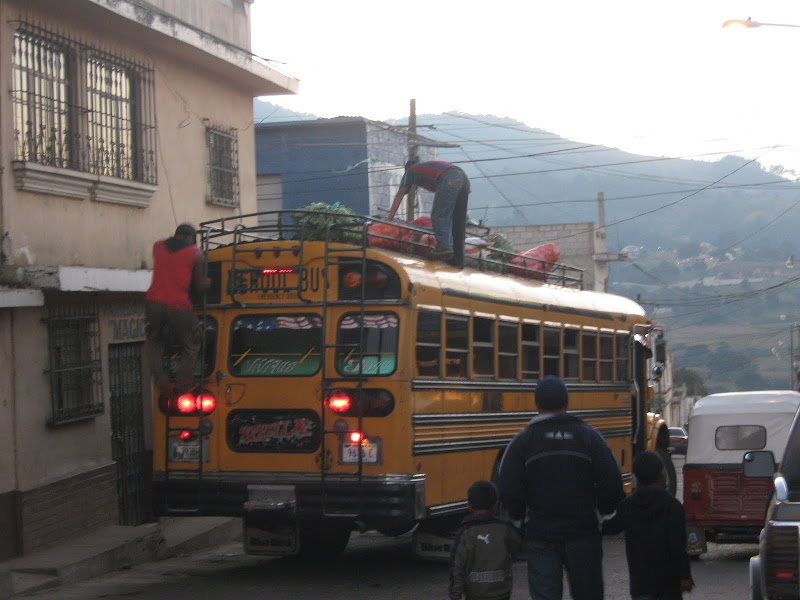As we celebrate the 4th Sunday of Advent, several thoughts crowd my mind this Sunday morning. It has been a wonderful and, at the same time, tough experience here in Guatemala so far. It is difficult to transmit the emotions that fill our minds and the things we see. Here are a few scattered thoughts from the last few days.
1. There are Christmas lights and (fake) Christmas trees here. Even if their abodes are humble and often very poor, people hang some Christmas lights and small lit Christmas trees or wreaths. We saw one that was hung between two windows over a street and held up with two ropes...
2. A great Christmas tradition in Central America during Chritmas time is
Las Posadas. People gather on the street with candles and guitars (and fireworks) and a statue of the nativity which they carry from house to house looking for a place to stay, remembering what Mary and Joseph did on their way to Bethelem. They do this every nights for ten days before Christmas. We participated for a bit, last night.
3. It is not easy to stay relaxed here, when you need/want to remind your children to wash their hands and/or use hand sanitizer every 10 minutes and not drink tap water or water from bottles once the cap has fallen on the ground... I may be a little too concerned about it, but at the same time we still hope to avoid any major "intestinal problems".
Everybody has warned us about them very strongly. For my friends at work: " we can only use bottles with crew-type caps here, which reminds me of the importance of the
tortous path concept :-) "
Oh, you also need to watch for cars. There are no pedestrian crossings here and cars do NOT yield to pedestrians....
4. We are learning more patience. People are not in a hurry and they hang out by the church, on the street, on the steps on their small houses. It seems like everytime someone goes by, somebody peeks out and checks out what is going on.
5. It´s pouring rain now. Very unsual for december/dry season. The street we are on is a river with water flowing toward the lake. Clearly there is not much of a drainage system. In fact, as I look out the window, I cannot locate any water drains on the street.... There are also no trash cans, which means a lot of the garbage gets thrown on the ground, making for a dirty mess. Still, S. Lucas Toliman seems cleaner than the capital city, the other San Lucas where we have been and the poor villages in the mountains where the clinic is. Trash collection happens in the main towns, but enviromental concerns are surely NOT on the top of the priorities of central american countries. People here struggle to feed themselves...
6. The atmosphere at church was wonderfully simple and humble this morning. The church is an old stucco structure with sad looking statues along the aisle. Emma says they are scary looking. I tend to agree. Father walks down the aisle shaking hands with everybody and hugging chidren. A marimba, two guitars, a bass and a mandolin play church latin music. Father sits in the first row with the people, not on the altar. People are dressed in simple clothes, women in their Mayan outfits with babies strapped around their backs.
7. They had a piñata "party" in front of church yesterday afternoon. Dozens of children tried to break it, then attached it... Wrapped and unwrapped candies poured out. They disappear from the ground in a few seconds, even the unwrapped ones.
8. People stare timidly at us when we walk by. We clearly stand out. Apparently the local indegenous people feel white people are superior to them.
"How wrong they are", I think. If you smile at them, the smile back and greet you. They are very warm and the sense of community is visible here, far from Guatemala City. It´s a community that revolves around the parish life and the many projects that the church offers. Overall, the projects employs about 400 people.
 Lake Atitlan - the most beautiful lake in the world
Lake Atitlan - the most beautiful lake in the world






















































